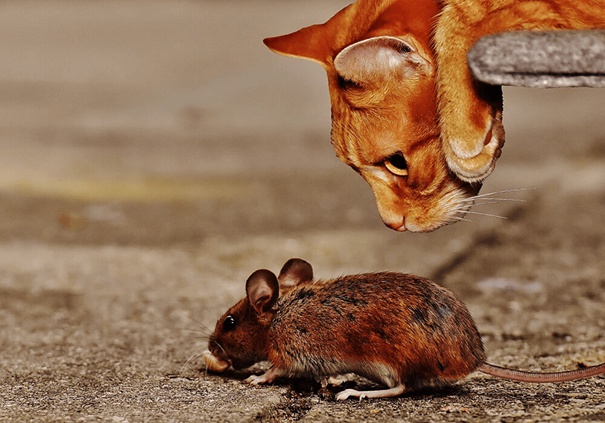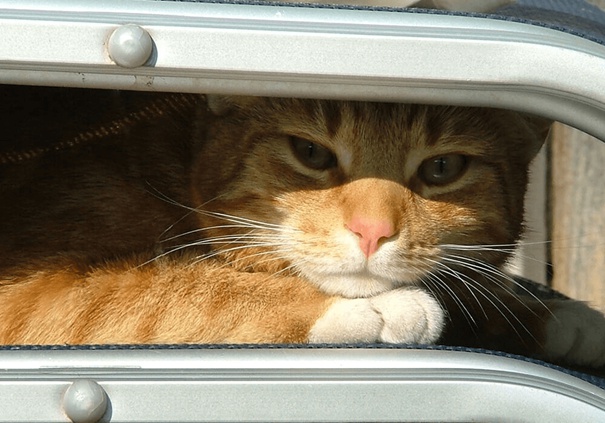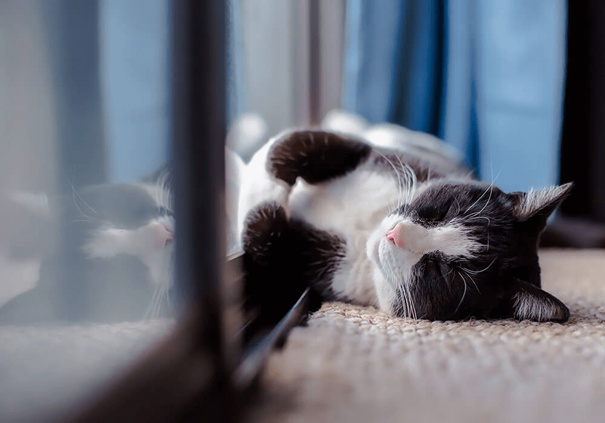My cat has gone missing, when should I start to worry?
It is completely normal to worry when your cat has disappeared for a long time. But after how long should you start to look for them?
In this article, we will tell you why a cat might go missing and after how long you should start looking for them.

Reading time : 8 min
Even though cats are territorial animals, their garden is not their only limit. Not only feral cats but also domestic cats have a large territory. A domestic cat’s territory goes way beyond your house. The limits are not only defined by your cat, but also by other felines in your neighbourhood. Their territory is divided by where your cat eats, relaxes, plays, hunts, and goes potty.
A cat’s territory can be unlimited if your cat has not been neutered. Your cat can walk hundreds of miles if they have smelled another cat in heat. During their different journeys, your cat can walk through gardens, roads, go hunting and take naps.
Most of the time, after their amble, your cat will come back home without you being aware of their secret life. So why do cats leave? How long do cats go missing for? Can a cat leave for a couple of days then come back?
TOPICS
Why do cats go missing?

Why is my cat not coming back?
Even thought it is completely normal to get worried if your cat does not come back, you should not panic and think about him being injured. This may happen, but these are not the only reasons your cat does not come back to his sweet home! And, don't worry, it has nothing to do either with your pet not liking you or feeling unwell in your home.
If your cat is a good hunter, it can happen that their territory is lacking prey, or prey have been hunted by other cats. Your cat might then be tempted to travel further away to find new catches.
A cat that has not been neutered can go to great length to find another cat in heat. Dominated by their instincts, your cat might have escaped for a few days and come back as nothing had happened.
Can a cat get lost?
Cats have an exceptional sense of direction thanks to their powerful sense of smell. They can find their way back home because they leave olfactory traces along the way. All cats have scent glands on many parts of their body such as their paws pads, cheeks, lips, forehead, flanks and tail.
During their walks, your cat rubs their face, scratches trees, and pees to diffuse their pheromones and leave a trace. Even if they remain very rare, there are stories of cats finding their way back home after months of wandering.
So, can a cat ever get lost? It seems unlikely, but they can get scared by a loud noise, a stressful situation or can get carried away by prey and struggle to find their way back home.
How long can a cat go without food or water?
Just like humans, in any extreme situation, a healthy adult cat can go a couple of weeks without eating, while still being able to drink. However, they can only survive 3 days without water. That is why you should not hesitate to contact your neighbours in case your cat goes missing. They might have gotten stuck somewhere.
How long do cats go missing for?

It depends on the cat’s territory and routine. A cat that is particularly adventurous and independent could spend a couple of days outside without coming home. But the risk of a cat getting lost or injured is higher with a scaredy-cat or a kitten.
Some cats that are free to go outside can spend the whole day outside and come back to eat in the evening, others might nap and cuddle inside during the day and go hunting at night.
Some adventurous cats can also spend a couple of days outside and come back as if nothing happened. They might have been led by prey or have smelled another cat in heat and not have followed their routine. They might come back dirty and full of fleas; it is then important to properly clean them and treat any parasites.
You do not need to worry if your cat leaves, however, if it has been more than two days, you should consider notifying your local vet and animal warden that your animal has not come back, as they might have been injured, preventing them from coming home.
Find out the 5 most important steps to find your lost pet
All the information you need to find your beloved companion
What to do when your cat is not coming home?

If your cat is not coming home, do not hesitate to walk around your neighbourhood calling their name. Hearing your voice might remind your cat that a loving family and good food is waiting for them. If they are not responding to your calls, they have probably ventured further away. It is important to keep in mind that the earlier the search begins, the higher the chances of finding your cat.
Search your house
Search every corner of your house first before you start a serious search. Also consider checking out their usual hideouts, you never know your little furry friend might just be hiding in one of their favourite places. If your cat cannot be found, move on to the next step.
Launching a “missing cat” alert
If a cat breaks their routine, it is important to report it. Notify your vet that your cat has gone missing, they will be on the lookout if someone brings a cat that might look like yours. Be sure to microchip your cat beforehand and update their data regularly. You can also let your local animal warden know that your cat has gone missing.
Putting up lost posters
It is also very important to let your neighbours and any passers-by know of your cat’s disappearance. Put up lost posters and hand out flyers with a picture of your cat, any distinctive signs, and your contact information.
Put up lost posters on electric polls, on your supermarket noticeboard and slip flyers in letterboxes. Do not forget to ask your neighbours to check their garage and garden shed, your cat might have gotten stuck in there.
Publishing on missing pet websites
Do not hesitate to publish a message on a social media group or a missing pet website. Websites like Animal Search UK specialise in missing cats cases and works with volunteers to help you reunite with your cat.
Facebook groups like Lost and Found Pets UK is full of animal-loving people and can be of great help to help you find your missing cat.
How to prevent your cat from running away ?

Spaying and neutering
A cat’s mating instinct is very strong. When another cat is in heat, your cat might want to get to them as quickly as possible. That is why you should consider spaying or neutering your cat.
Once a female cat is spayed, she becomes more of a homebody and prefers staying with her owners. A male cat that is neutered becomes cuddlier and does not yearn to go out and meet females. It does not mean that your cat won’t want to go out anymore, but they might not try to constantly run away.
Clicker training
Clicker training is a training method that works well on cats. It consists of combining action, a click, and a treat as a reward. In other words, when you want the cat to come to the call of their name, all you have to do is click and give a reward when they look at you.
As soon as this step is integrated, you will click when they come closer to you, and so on. With short but regular exercises, the cat will understand that when they come to the call-back, they get a reward. It is understood that a click is a mandatory reward. Learning the call-back with the clicker is very effective.
Using a GPS tracker
Attaching a cat GPS to their collar or harness can give you, the owner, real peace of mind. A GPS tracker is light and small, and it is not uncomfortable for the cat. It is very useful for the owners to track their cat’s every move. And if the cat is not coming home, it is easier to trace them.
The tracker also has a call back option with an integrated clicker and when trained, your cat will come back each time their owner clicks it.
Do you need help to find your pet?
In this guide, you will find 5 key steps to follow to conduct an effective search and to find your pet as soon as possible.
Can I consider not letting my cat outside ?

To prevent their cats from running away, some cat owners might prefer keeping their cats inside from outside dangers and dishonest people. This decision, even though going against a cat’s instinct, is a good way to keep a cat safe.
What are the differences between an indoor and outdoor cat?
It is easier to keep a cat inside when you live in a flat. But it also depends on the breed. Some breeds like Persian cats, Russian cats, Ragdoll cats, or Birman cats are known to be homebodies.
A kitten that has been used to living inside might not be frustrated being kept indoors. They will grow up without missing the great outdoors as they have never experienced it.
It is different for outdoor cats as they feel freer and have been used to going outside. In that case, it might be harder to keep your cat inside. It is also not a matter of prohibiting your cat from going outside all of a sudden, or you might get stuck with a cat crying and meowing all day at the door.
If you do not have a cat flap, it will be easier to stop your cat from going outside. Some cat flaps can be programmed, and you can block the opening during certain hours. At first, the cat may express their displeasure with a nagging cry, so it is important to hold on and not give in. They will eventually get used to a new routine, whether they like it or not.
Once your cat has got used to not go out at night, you can reduce their daytime outings by delaying their first stroll or calling them home early.
How to make an indoor cat happy?
It is important to give your indoor cat what they will find outside for their physical and mental wellbeing, such as:
- Catnip to satisfy their need for nature. Catnip is also known to aid digestion and promote regurgitation of hairballs once ingested. A godsend when you know that cats swallow quite a bit of hair during grooming.
- A clean and accessible litter.
- Toys as well as playtime that mimics hunting. Even domesticated, cats still have a hunting instinct. Toys can vary from mice, pillows, and feathery toys.
- A cat tree will allow your cat to get higher from the ground. They can also sharpen their claws on it, without damaging your furniture.
- Hiding places where they can feel safe and not get disturbed.
- Reduced food portions. Since your cat will not be exercising outside, it is important to watch what they eat.
Conclusion
Whether they have gone hunting, mating, or are lost, it is essential to not waste any time once you have realised your cat has gone missing. You should contact and notify local groups as well as wardens and neighbours. If your cat comes back, you will only have to notify everyone of their return. If they don't, you can maximise your chances of getting your cat back.
Neutering your animal is highly recommended to calm your cat down. A clicker and GPS tracker are also great tools to locate and bring back your cat quickly.
But if you are still too afraid to let your cat out, be sure to provide and meet them different needs to assure their happiness, comfort, and health.
Continue reading our guide
This article is part of a complete guide on the subject. Do not miss the next chapters.
How to find a lost pet ?
Discover the 5 most important steps
All the information you need to find your beloved companion


